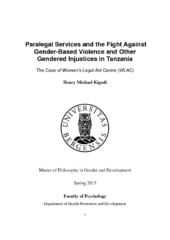| dc.description.abstract | Gender-based violence (GBV) is a key dimension which has brought attention across gender stakeholders in Tanzania regarding its prevalence. It is a phenomenon which we face every day from household levels to national levels. It is a topic on which there is a great misunderstanding and belief that, women and men are not equal because of patriarchy practices and societal structures. Such gender roles and patterns have placed women and girls vulnerable to the situation and practices in several communities. In Tanzania, GBV has been one of the thematic areas for various non-state actors such as civil society organizations (CSOs), non-governmental organizations (NGOs), and donors collaborating to fight against the rampant phenomenon. The Women's Legal Aid Centre (WLAC) collaborating with the Norwegian Church Aid as among of the non-state actors took one of the significant steps introducing free legal assistance to help survivors of GBV and other gendered injustices. The organizations have been working through training paralegals to provide services to women and girls in rural areas and up country. The motives behind WLAC using the paralegals, it was noted that most of the survivors and victims of GBV and other gendered injustices are incapable of handling legal fees and are facing scarce number of lawyers for help. The study explores the roles and actual changes brought by the paralegals to women and children and how the communities perceive their presence on fighting GBV and other gendered injustices in Tanzania. This study was qualitative in nature conducted in Tanzania from June to mid-September in four regions namely Dar es Salaam, Mbeya, Iringa, and Manyara. The study involved different methods of data collection. Such methods include semi-structured interviews, focus group discussions (FGDs), participant observations, and review of secondary data. The findings of this study showed that many beneficiaries had benefited from the paralegal services. Different views were reported on the presence of the paralegals in the community. The study concluded that the problem of GBV and other gendered injustices is a wide spread phenomenon in Tanzania which needs extra tackling initiatives. There is acknowledgement from different ways proving that GBV has severe harm to many women and girls. Therefore, paralegal services should be expanded and given formal recognition to provide legal assistance to many survivors of GBV and other gendered injustices in Tanzania. | en_US |
